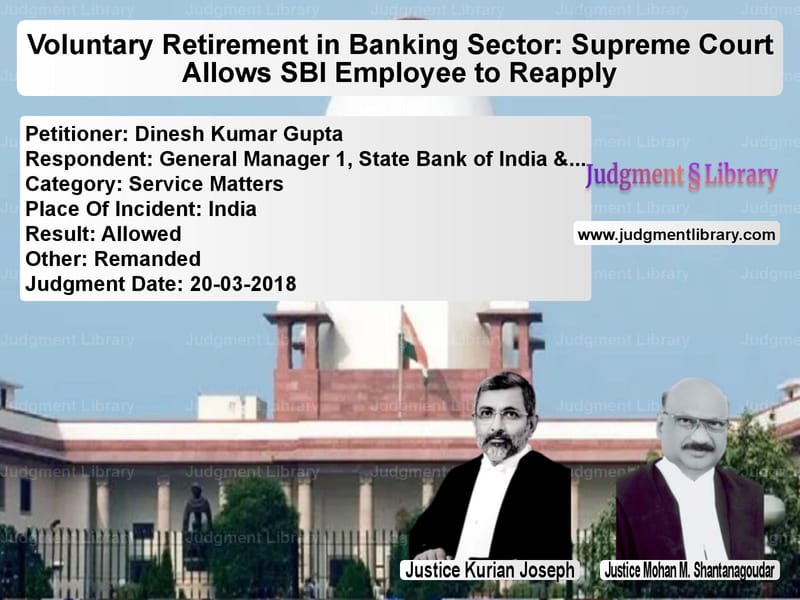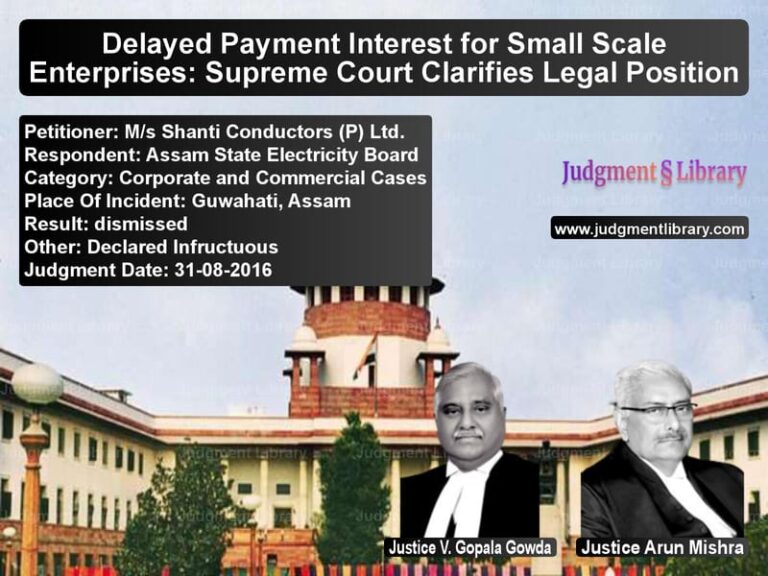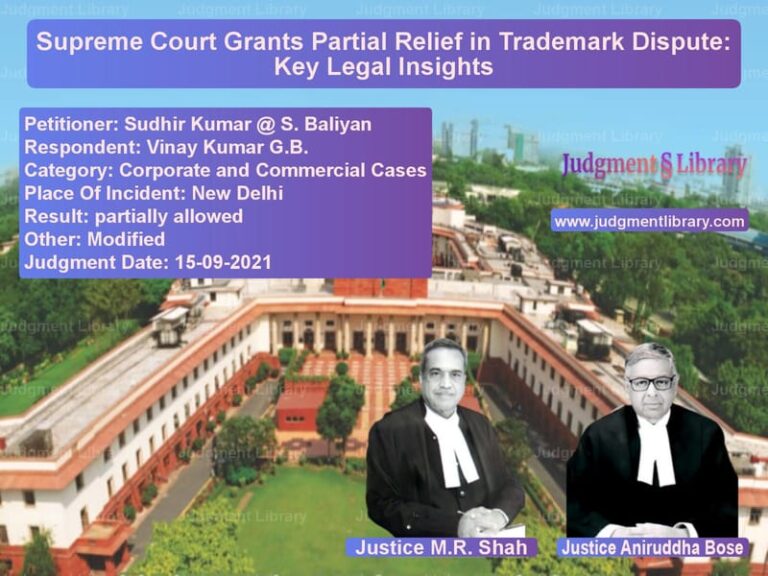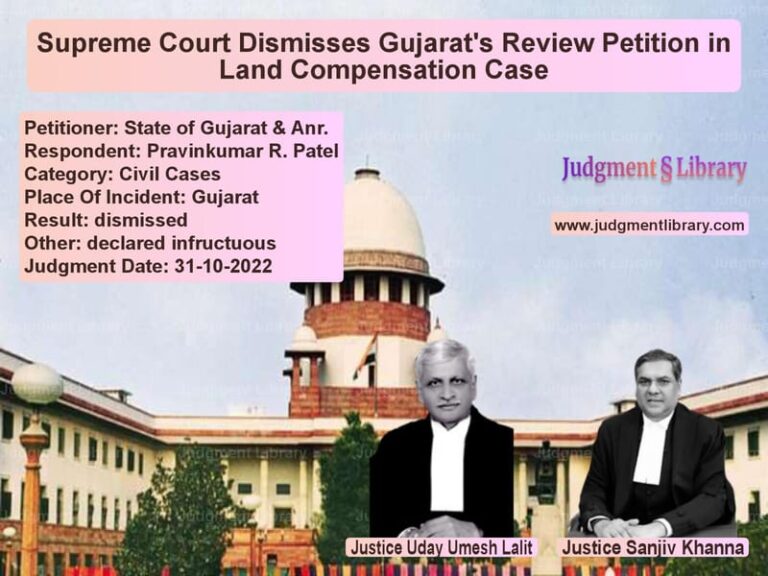Voluntary Retirement in Banking Sector: Supreme Court Allows SBI Employee to Reapply
The case of Dinesh Kumar Gupta v. General Manager 1, State Bank of India & Ors. is a significant ruling concerning voluntary retirement applications in the banking sector, particularly when disciplinary proceedings are pending. The Supreme Court ruled in favor of the appellant, allowing him to reapply for voluntary retirement after the conclusion of disciplinary proceedings. The judgment ensures that employees are not unfairly barred from availing retirement benefits due to procedural delays.
Background of the Case
The appellant, Dinesh Kumar Gupta, had applied for voluntary retirement from the State Bank of India (SBI). However, his application was rejected due to the pendency of disciplinary proceedings. The appellant challenged this decision before the High Court, which upheld SBI’s stance, stating that the bank was justified in rejecting his voluntary retirement request.
Aggrieved by the decision, the appellant approached the Supreme Court, arguing that his rights were being unfairly curtailed due to prolonged disciplinary proceedings. During the pendency of the appeal, SBI completed the disciplinary inquiry and imposed a penalty of ‘lowering of one grade’ on him. This development became central to the Supreme Court’s final ruling.
Petitioner’s Arguments
The appellant, Dinesh Kumar Gupta, contended that:
- His voluntary retirement request should not have been rejected outright, as disciplinary proceedings were not an absolute bar under the applicable rules.
- The delay in the conclusion of the disciplinary proceedings caused undue hardship, preventing him from availing retirement benefits in a timely manner.
- The penalty imposed was minor (lowering of one grade), and there was no reason to continue denying his request for voluntary retirement.
- He was entitled to receive arrears of salary and allowances that were withheld during the pendency of proceedings.
Respondent’s Arguments
The State Bank of India defended its decision, arguing that:
- Pending disciplinary proceedings were a valid ground to reject voluntary retirement applications.
- Allowing voluntary retirement during an ongoing inquiry could set a precedent for employees to evade potential penalties.
- The rules governing voluntary retirement clearly allowed discretion to the employer in such matters.
Supreme Court’s Observations
The Supreme Court made several key observations:
1. Disciplinary Proceedings and Retirement Requests
The Court acknowledged that while employers have the discretion to reject voluntary retirement applications during pending inquiries, such discretion must be exercised reasonably.
“Once the disciplinary proceedings have been concluded, the ground for rejecting the voluntary retirement application no longer holds validity.”
2. Fairness in Processing Retirement Applications
The Court emphasized that procedural fairness must be maintained, and employees should not be unfairly prejudiced due to administrative delays.
“The rejection of voluntary retirement must not serve as a punitive measure, particularly when the imposed penalty is minor.”
3. Right to Reapply for Voluntary Retirement
The Court ruled that the appellant was now entitled to reapply for voluntary retirement since the disciplinary proceedings had concluded.
“Since the disciplinary proceedings have been concluded, it is open to the appellant to apply for voluntary retirement afresh, if so advised, in which case, his application can be processed by the Bank.”
4. Payment of Arrears and Allowances
The Court directed SBI to clear any pending salary or allowances due to the appellant within one month.
“The Bank shall clear the arrears of salary and allowances, if any, within a period of one month from today.”
Supreme Court’s Final Verdict
The Supreme Court ruled as follows:
- The appeal was allowed, setting aside the High Court’s ruling.
- The appellant was granted the right to reapply for voluntary retirement.
- The bank was directed to clear any pending dues within a month.
- The judgment would not affect the appellant’s right to challenge the penalty imposed in disciplinary proceedings.
Key Takeaways
- The ruling clarifies that voluntary retirement cannot be indefinitely denied due to pending disciplinary proceedings.
- Once disciplinary proceedings conclude, employees have the right to reapply for voluntary retirement.
- Employers must ensure procedural fairness when rejecting voluntary retirement applications.
- The Court recognized that minor penalties should not prevent employees from availing retirement benefits.
Conclusion
This Supreme Court ruling sets an important precedent in service law, particularly for employees facing disciplinary proceedings. By allowing the appellant to reapply for voluntary retirement, the Court ensured that administrative delays do not unjustly impact an employee’s rights. The decision serves as a guiding principle for fair employment practices in the banking sector and beyond.
Petitioner Name: Dinesh Kumar GuptaRespondent Name: General Manager 1, State Bank of India & Ors.Judgment By: Justice Kurian Joseph, Justice Mohan M. ShantanagoudarPlace Of Incident: IndiaJudgment Date: 20-03-2018
Don’t miss out on the full details! Download the complete judgment in PDF format below and gain valuable insights instantly!
Download Judgment: Dinesh Kumar Gupta vs General Manager 1, S Supreme Court of India Judgment Dated 20-03-2018.pdf
Direct Downlaod Judgment: Direct downlaod this Judgment
See all petitions in Termination Cases
See all petitions in Public Sector Employees
See all petitions in Disciplinary Proceedings
See all petitions in Judgment by Kurian Joseph
See all petitions in Judgment by Mohan M. Shantanagoudar
See all petitions in allowed
See all petitions in Remanded
See all petitions in supreme court of India judgments March 2018
See all petitions in 2018 judgments
See all posts in Service Matters Category
See all allowed petitions in Service Matters Category
See all Dismissed petitions in Service Matters Category
See all partially allowed petitions in Service Matters Category







